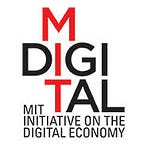Economists See Humans Holding the Key to AI
MIT speakers describe tech optimism, but also economic concerns as AI takes hold
By Paula Klein
The AI revolution is underway. It’s already disrupting decades-old work paradigms and more disruption — at an even faster rate — is looming. Moreover, MIT IDE experts say, today’s AI is more advanced than just a year or two ago, as evidenced by developments in voice, image, and even facial recognition that have “crossed a threshold” in terms of accuracy and technological improvements.
Today’s formidable challenge, however, is to prepare — educationally, economically, and socially — for these changes, while also keeping labor, wages, and productivity in check.
These are some of the conclusions and action items gleaned at a two-day event on AI and the Future of Work hosted by MIT’s Computer Science and Artificial Intelligence Lab (CSAIL) and Sloan’s Initiative on the Digital Economy (IDE) November 1 and November 2. The conference brought together thought leaders from academia, business, and public policy for an open dialogue about AI’s impact.
The first day focused on helping industry understand how to navigate the opportunities and challenges of the new technologies, while the second day provided insights about the workforce. Here are some key IDE takeaways.
Erik Brynjolfsson
IDE Director, Erik Brynjolfsson, set the tone by saying that the proliferation of data, digitization, computer power, and sophisticated algorithms are fueling AI. “I’m optimistic when I see a ten-fold increase in researchers entering the AI field.”
Machine learning and neural networks have “crossed a threshold,” he said, allowing machines to recognize objects and images better than humans in some cases.
At the same time, Brynjolfsson said the economic results have not been as dramatic, and the full effects — positive and negative — of AI will be realized over time. “The technology is amazing, but it doesn’t instantly get translated into economic benefits. It could take decades to play out.” In the interim, productivity, wages, and employment remain flat and require investments in education, training, and entrepreneurship. In addition, businesses and society as a whole must embrace new jobs rather than protecting the past.
As a general-purpose technology, AI will drive great change in the long run, but could also be responsible for productivity slowdown in the short-term. It’s up to us to put the new technologies to work in ways that accelerate the benefits, he said. They’re not automatic.
Andrew McAffee
During his panel presentation, Andrew McAfee, IDE Co-director, addressed the realities of AI as well as some misconceptions. McAfee said he is frequently asked three questions about the future of work:
- Has the economy been hijacked and taken over by wealthy financiers creating huge gaps between rich and poor? No, but a structural transformation is taking place and technology and globalization are the tectonic forces driving that.
- Do we need to worry about permanent technology monopolies? No. “I remember when, at various times, people were worried about IBM, Microsoft, and AOL taking over their industries.” Even, 10 years ago Nokia was a huge contender. But we see that the pattern of dominance doesn’t last.
We don’t know what will unseat today’s giants, or when, but this is not what antitrust is about.
3. What will be the jobs of the future? They will be different and perhaps not as plentiful or in same industries. Some jobs will disappear. In fact, manufacturing jobs peaked in 1979 in spite of technological progress. Overall, however, technology is creating more wealth; it’s the stagnation of the middle class that has become a problem, and that’s where the focus needs to be.
Sandy Pentland
Alex “Sandy” Pentland, Professor at the MIT Sloan School of Management, said we need new ways to imagine work and organizations going forward. Rather than broadly thinking about jobs as “static, rote industrial-age things,” he suggests we consider the “interconnectedness of tasks.”
Social networks demonstrate that idea flow generates value, and it’s how we add value to our network of ideas that matters, according to Pentland. Machines can do a lot of tasks, but humans interpret and analyze our complex world.
In Pentland’s view, the challenge is not whether to replace the “antiquated notion of jobs,” with new jobs, but to re-imagine social and business networks and then find the best role for humans and machines in these fluid interactions. The “magic of AI” will be when we can offer continual feedback to make companies more intelligent, he said.
View more details, speaker list, and agenda at http://futureofwork.mit.edu
Video now available on YouTube here.
